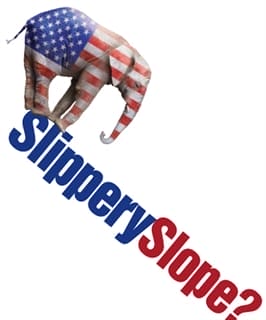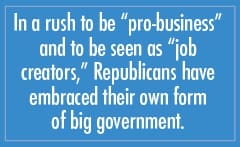With trade protection and corporate incentives, politicians could lose the firm footing of their free-market principles
“Freedom is never more than one generation away from extinction. We didn’t pass it to our children in the bloodstream. It must be fought for, protected and handed on for them to do the same, or one day we will spend our sunset years telling our children and our children’s children what it was once like in the United States where men were free.” — Ronald Reagan
The Gipper was right about so many things, including, unfortunately, that freedom is never finally and forever won but must be continually defended and fought for.
On the left, socialism seems to be enjoying a strange new respect. As the Clintons retreat into history, the “triangulation” that they championed — a policy of strategic retreat and concessions to free markets and a more modest state — seems on the wane.
Bill Clinton declared the era of big government to be over. Bernie Sanders and Elizabeth Warren want it back. The new face of the Democratic Party is New York congressional candidate Alexandria Ocasio-Cortez, a millennial version of the New Socialist Woman whose discombobulation over facts never seems to dent her self-esteem.
The New York Times publishes op-eds from academics who argue that the only way we can be free is to force others to give us free stuff. The left wants us to know that not only can we have our cake and eat it, but someone else will pay for it.
The new socialists may not want the state to own the means of production, but they do want the state to control them. They prefer politics to markets and the collective to the individual. They have confronted the problem of scarcity — the idea that resources are limited — and wished it away.
But this new collectivism is present on the right as well. The most obvious example is increasing enthusiasm for trade protectionism, which deploys politics to protect some Americans from foreign competitors at the expense of other Americans who benefit from trade. It is redistribution cloaked in nationalism.
And then we have the “public-private partnership” — the notion that the state ought to tax some Americans and give the money to private businesses to subsidize a development that ostensibly “wouldn’t have happened” without public largesse. This crony capitalism takes a number of forms: protectionist regulation, tax incremental financing and unalloyed handouts. It is almost always a mistake.
It is a mistake because politicians are poor economists. Writing in the mid-19th century, French economist and author Frederic Bastiat famously observed that a bad economist only considers “the visible effect” and not “both … the effects which are seen, and also of those which it is necessary to foresee.”
As a result, “the bad economist pursues a small present good, which will be followed by a great evil to come, while the true economist pursues a great good to come — at the risk of a small present evil.” History does not tell us whether Bastiat ever visited Washington, D.C., but he certainly understood the swamp.
Post-war American conservatism has generally held that government shouldn’t be in the business of picking winners and losers. A political authority can never have the knowledge that is wielded by numerous market participants whose individual choices yield a more efficient allocation of resources than any politician or group of politicians could ever command.
As Austrian economist Friedrich Hayek put it, “The curious task of economics is to demonstrate to men how little they really know about what they imagine they can design.” That observation also has been, however imperfectly and inconsistently, part of the genius of American conservatism.
But not always. In a rush to be “pro-business” (as distinct from “pro-market”) and to be seen as “job creators,” Republicans have embraced their own form of big government.
Rather than simply focusing on creating the proper conditions for economic growth through low taxes and a minimal regulatory burden (thereby facilitating the things that are unseen), they have found it politically profitable to lavish favored companies and industries with incentives and handouts (focusing on only the visible effect). As my colleague Collin Roth and I recently wrote in National Review, “Job totals are now tallied like points on a scoreboard.” And politicians take credit.
When challenged, Republicans often claim to be “pragmatists” living in “the real world.” But their pragmatism sometimes runs to their own political fortunes, not sound public policy. With respect to the latter, the politicians can be hopelessly soft-headed and mired in wishful thinking — imagining that they can direct our complicated economy and that they, through the exercise of their will, can manufacture prosperity.
Central planning does not become something else because it proceeds by ad hoc corporate welfare rather than five-year plans. Political control of the economy does not become a good idea because state ownership of the means of production is replaced with joint ventures in which risks are socialized and profits remain in private hands.
The result is market distortion, an inefficient use of resources and a program of economic development built on myths and hubris. It serves neither business nor workers.
Politicians have convinced themselves that without tax incentives — without them — new jobs would never be created and lost ones would never be replaced. This thinking is, quite simply, false. It fails to see what occurs in the economy every day when consumer choice and markets determine whether businesses succeed or fail.
Perhaps the much-ballyhooed Foxconn project in Wisconsin will be the exception that proves the rule. One could argue that, given the absence of a national requirement that public funds be used for public purposes, the Walker administration could not unilaterally disarm and that the size and scope of the project are transformational in a way that justified extraordinary measures. Only time will tell.
But departures from principle come at a cost, and now sundry and various businesses will want the Foxconn treatment. And politicians will always see the jobs they “save,” not the jobs that are lost because resources were diverted to a less efficient use.
Freedom works. It just requires a little faith, a bit of patience and, as President Reagan understood, the courage to defend it.
Richard Esenberg is president of the Wisconsin Institute for Law & Liberty.






